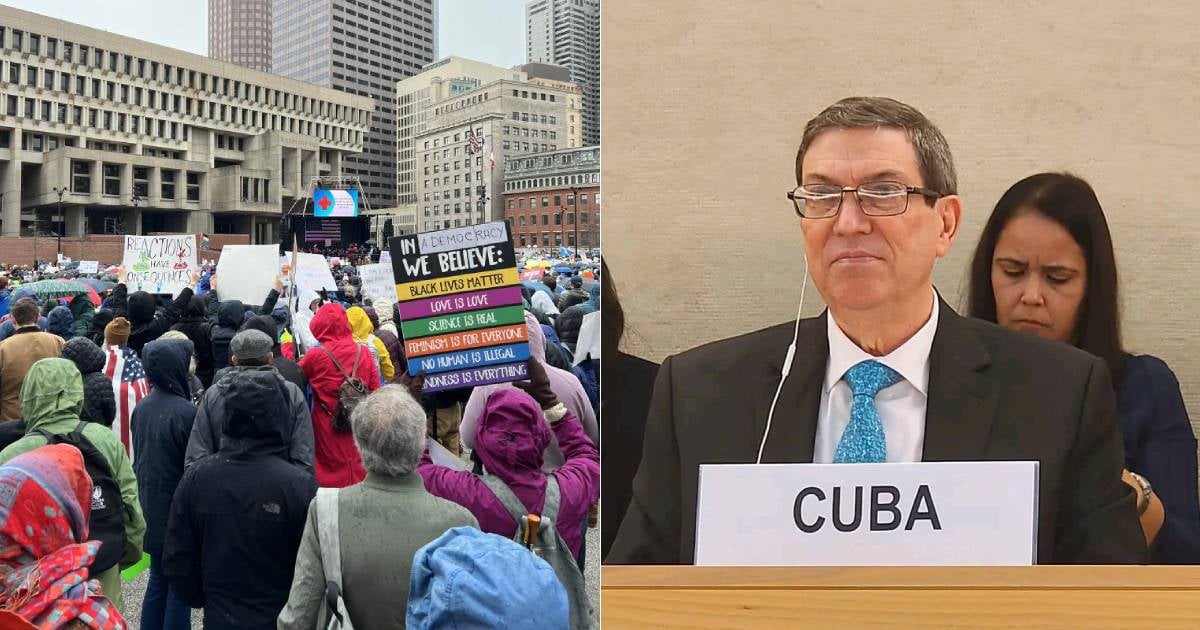In a blatant display of hypocrisy, Cuban Foreign Minister Bruno Rodríguez Parrilla recently praised the widespread protests taking place across the United States. Using his X account (formerly Twitter), Rodríguez expressed admiration, stating, "HandsOff protests in over a thousand cities across all 50 states of the #USA, involving nearly half a million people, denounce the plutocratic management governing this country in the interest of big capital against the aspirations of the majority of American citizens."
The Cuban government, through its official spokespeople and Communist Party-controlled media, has been amplifying these images of the marches. However, several users reminded Rodríguez that, unlike in Cuba, protests in the United States are legal, and citizens are not suppressed for exercising their right to free expression. Cuban activist Magdiel Jorge Castro responded, "It's fortunate that liberal democracy in the U.S. allows protest; in the regime you represent, it's forbidden."
Another user pointed out, "Oh, look, people protesting freely in a free country, something that can't be done in #Cuba," while an observer added, "Luckily, here we can protest." Further responses highlighted the lack of free elections in Cuba and the imposition of a single political system. "This is normal in a democracy. Elsewhere, they claim 'the streets belong to the revolutionaries' and declare 'the order is given.' Does that sound familiar?"
One commentator summed up the general sentiment with a pointed remark: "Sir, it takes a lot of nerve to make such a statement." The "Hands Off" movement emerged in response to policies during President Donald Trump's second term, particularly those related to social program cuts and the increasing influence of billionaire Elon Musk in government affairs.
These protests, occurring on Saturday, April 5th, were organized across all 50 states and supported by over 150 groups, including civil rights organizations, unions, and LGBTQ+ advocates. Protesters opposed measures like the firing of thousands of federal workers, the closure of social program offices such as Medicare and Medicaid, and the removal of protections for vulnerable communities, including immigrants and transgender individuals. They also criticized the establishment of the Department of Government Efficiency (DOGE), led by Musk, tasked with implementing these austerity measures.
Demands for Change in U.S. Policies
The movement's main demands include:
- Ending billionaire control over governmental institutions.
- Protecting and strengthening essential social programs.
- Restoring and expanding rights and protections for marginalized communities.
These protests represented one of the largest resistance mobilizations since the start of Trump's second term, highlighting growing public concern over federal policies and the influence of economic elites in governmental decision-making.
Meanwhile, in Cuba, any citizen attempting to publicly express dissatisfaction with the system faces criminalization, persecution, or imprisonment. Protests are met with arbitrary arrests, internet blackouts, police deployments, and defamation campaigns against demonstrators.
The hypocrisy doesn't stop there. While the Cuban government celebrates the allowance of free protests in the U.S., Cubans lack real constitutional guarantees to exercise the same right. Article 56 of the Constitution, which acknowledges the right to peaceful assembly, remains ineffective as no decree has been enacted to enforce it. Each protest attempt is treated as a threat to the "socialist order."
The Cuban regime's inconsistency in celebrating foreign protests while prohibiting domestic ones is not new but becomes especially grotesque given the current context. The official machinery, which demands respect for sovereignty and non-interference when it comes to Cuba, does not hesitate to comment on, amplify, and manipulate occurrences beyond its borders to bolster its political narrative.
Questions About Cuban and U.S. Protests
Why does the Cuban regime celebrate U.S. protests?
The Cuban regime celebrates U.S. protests as a way to criticize American governance and support narratives that align with its political stance, despite its own restrictions on protests at home.
What are the main demands of the HandsOff movement?
The HandsOff movement calls for ending billionaires' control over governmental institutions, protecting and strengthening social programs, and restoring rights and protections for marginalized communities.
How are protests in Cuba typically handled by the government?
In Cuba, protests are often met with harsh repression, including arbitrary arrests, internet blackouts, police presence, and defamation campaigns against those involved.
